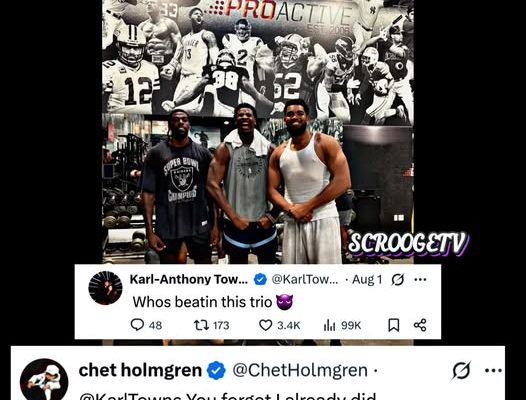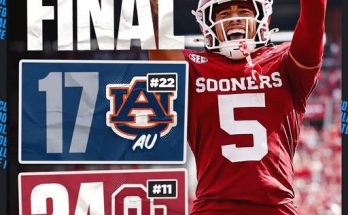Chet Holmgren has never been one to shy away from a challenge. Whether it’s battling elite big men in the NBA or defending his team’s reputation, the young Oklahoma City Thunder star has quickly carved a lane for himself as one of the league’s most versatile and vocal emerging talents. And recently, that voice delivered a shot heard across social media. After Karl-Anthony Towns made a rather bold post about his place in basketball history, Holmgren’s subtle but savage comment stirred the pot in a way that ignited fans, drew reactions from peers, and rekindled an ongoing debate about legacy, performance, and respect in today’s NBA.
It all started when Towns took to social media to share a motivational message, but with a twist of self-glorification that many interpreted as excessive. The Minnesota Timberwolves star, who has long been known for his confidence, posted a photo of himself in game action with the caption, “When it’s all said and done, they’ll say I changed the game.” It wasn’t the first time Towns claimed he belonged in the conversation of game-changers, and it likely won’t be the last. But the comment struck a nerve in the online basketball community, which has always scrutinized players who talk big but haven’t delivered titles, consistent playoff runs, or signature postseason moments.
Enter Chet Holmgren.
Underneath Towns’ post, Holmgren dropped a single-word comment: “How?” That one word was all it took to turn NBA Twitter into a wildfire. No emojis. No explanation. Just “How?” It wasn’t a direct insult. It didn’t need to be. It was surgical. Fans, players, and analysts immediately picked up on the shade. It was a moment of Gen Z NBA trash talk, executed with precision, packed into a single syllable. And just like that, the subtle jab triggered a deeper conversation.
Holmgren, still just a couple years into his NBA career, has built a reputation not only as a defensive anchor and high-IQ player but also as someone with an edge. While he doesn’t dominate the news cycle the way Victor Wembanyama or Zion Williamson might, Holmgren’s quiet intensity, his shot-blocking prowess, and his no-nonsense approach to the game have made him a favorite among Thunder fans and a respected name across the league. His reply to Towns, while short, was representative of a broader feeling held by many: that Karl-Anthony Towns, for all his talent and numbers, has not yet translated his skill set into meaningful postseason success or game-altering influence.
And that’s where the heart of the matter lies.
Towns, a three-time All-Star and former Rookie of the Year, has averaged over 20 points and 10 rebounds for his career. He’s arguably the best shooting big man in the league statistically. But he’s also been part of a Timberwolves team that, for much of his tenure, has underperformed or been mired in organizational chaos. Aside from a few playoff appearances, including the 2023 run that saw them win a play-in game and push into the first round, Towns has largely been viewed as a regular-season star. Despite immense offensive skills, his leadership, consistency, and defensive commitment have all been questioned. He’s had high-profile teammates—Jimmy Butler being one—but those partnerships never lasted, with rumors suggesting Towns didn’t rise to the challenge of tough leadership.
So when he says he “changed the game,” the natural follow-up question from anyone who’s been paying attention is… how?
Holmgren’s comment hits especially hard coming from a player whose career is only just beginning but already shows signs of being transformative. Unlike Towns, Holmgren has been part of a culture in Oklahoma City that emphasizes defense, unselfish play, and long-term development. With Shai Gilgeous-Alexander as the lead scorer, and a core of disciplined, motivated players like Jalen Williams and Josh Giddey, the Thunder are not only on the rise—they’re doing so without the kind of media hype or self-aggrandizing narratives that surround players like Towns. Holmgren is already impacting games defensively in a way that few rookies ever do, and his skill set fits the modern NBA: a 7-footer who can switch on the perimeter, protect the rim, and hit threes without dominating the ball.
The contrast between the two players—Towns, the talented but often frustrating veteran, and Holmgren, the no-nonsense upstart—adds extra weight to the comment. And fans weren’t shy about picking sides. Many jumped into the comment thread to echo Holmgren’s sentiment, pointing to Towns’ playoff record, his disappearing acts in big games, and his struggle to lead a team deep into the postseason. Others defended Towns, arguing that he’s been unfairly criticized and that changing the game doesn’t always mean winning titles. Some cited his three-point shooting percentages and positional versatility as proof that he’s reshaped the role of a modern center.
But for many, the response was simple: let the accolades, not the captions, do the talking.
Interestingly, the Timberwolves-Thunder dynamic has been brewing for a while. Both teams reside in the Western Conference, both are building toward long-term relevance, and both feature star big men with very different approaches to the game. When they’ve met on the court, there’s been real competitiveness, with Holmgren not backing down despite giving up experience and weight. Their one-on-one matchups have already shown flashes of intensity—Holmgren’s blocks, Towns’ post-ups, and the kind of physicality that suggests neither wants to lose to the other.
What’s most telling is how this kind of digital exchange underscores the generational shift happening in the NBA. Older stars like LeBron James, Kevin Durant, and Stephen Curry built their legacies over time, through consistent playoff success, MVPs, and championships. The younger generation—players like Holmgren, Paolo Banchero, and Scoot Henderson—are stepping into a league where social media is as much a battleground as the hardwood. They’re savvy. They know how to let a comment do the work of a press conference. And when they throw shade, they often do it in a way that leaves just enough ambiguity to avoid fines or controversy, but enough sting to send a message.
Holmgren’s “How?” might be remembered not just for its pettiness, but for its power. It was a moment that revealed how players think, how they assess each other, and how even a rookie isn’t afraid to call out what he sees as inflated narratives. For Towns, it may have been just another motivational post. For Holmgren, it was an opportunity to speak up—quietly, confidently, and directly.
What happens next will be fascinating. Towns hasn’t responded, and maybe he won’t. But the seed has been planted. The next time these two meet on the court, the spotlight will burn just a bit brighter. Every possession between them will carry the weight of subtext. Every post-up, block, or foul will be seen through the lens of their social media moment. And that’s the nature of today’s NBA: where drama is no longer confined to the 48 minutes of play, and rivalries are often sparked by a single word.
In the bigger picture, Holmgren’s comment signals a shift in how respect is earned in the league. It’s no longer enough to put up big numbers. The new generation demands substance. They value defense, team play, and authenticity. Towns’ flashy stats and self-promotion might resonate with some, but to players like Holmgren, respect comes from grind, not grammar. From blocks, not boasts.
It’s easy to dismiss moments like these as Twitter beef or social media theater. But they matter. They shape narratives. They influence how fans see players, how players see each other, and even how legacies are remembered. Towns may have intended his post as a confidence booster, but Holmgren flipped it into a referendum on authenticity. And in doing so, he reminded everyone watching that he’s not just here to play—he’s here to challenge.
Whether Holmgren goes on to win Defensive Player of the Year awards or becomes the face of a championship Thunder team remains to be seen. But one thing is clear: he won’t be content to let inflated claims go unchecked. He’s part of a generation that demands proof, not platitudes. And in the world of professional basketball, sometimes the strongest statement you can make is a single, sharp question.



